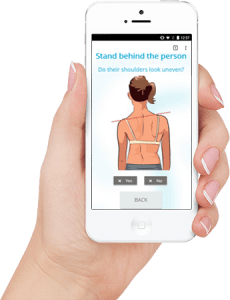Over the last few weeks, we have looked at the causes, consequences and treatments available for scoliosis. June 2019 is scoliosis awareness month, and we will be running some special events at the clinic for those who want to learn more or are concerned about scoliosis. Watch this space for more details. This week, for our final article in this series, let’s look at what you can do to raise awareness and promote early detection.
Talk about scoliosis with friends and family, especially parents
One of the biggest problems with scoliosis is the fact that its often so little talked about. Although scoliosis affects approximately 3 or 4 percent of children, and as much as 40% of the over 60’s many people are still unaware of the risk it poses.
This lack of awareness means that parents, friends and carers – with the best will in the world – just don’t know the signs or what to do if they have concerns. There have been well organised campaigns to make the public aware of potentially serious conditions, such as meningitis, in children and adolescents, but almost nothing on scoliosis.
Simply talking to friends and family about scoliosis can therefore make a massive impact. Using tools like ScoliScreen, its easy to estimate your risk profile and to find out how to seek help, but raising initial awareness depends upon conscientious members of the public highlighting the issue.
Advocate for school screening.
In many countries school screening for scoliosis is provided as part of the spectrum of health services available for children. In some locations, such as Hong Kong, scoliosis screening is seen as vital, just like immunisations. Sadly, in the UK there is no formal program of screening – which means most children will never be screened for scoliosis.
School screening is an important and highly effective way to reduce the number of people who eventually require scoliosis surgery, since scoliosis tends to be noticed first amongst school age children. In addition, like many conditions, scoliosis is much easier to treat when it is spotted early, leading to overall better outcomes.[1]
Screening services are available (we are happy to arrange free school screening visits all year round) but the lack of a centralised organisational structure for scoliosis management in the UK means that Head teachers, teachers and PTA members need to reach out to get the ball rolling. If you work in a school, or are involved in school governance at any level, suggest a school screening event at your next meeting.
It’s not just school screening which is beneficial – any kind of environment which has a high percentage of young people, aged roughly 8-15 in particular, would be an excellent place to implement a screening program. Private clubs and organisations do a better job of scoliosis awareness than schools at present, and many clubs and organisations involved with activities which seem to carry a higher risk of scoliosis (such as ballet or gymnastics) do either offer some form of screening, or have invested in specialist scoliosis awareness training for their staff. If you’re involved in a local club which has nothing in place however, get in touch for a free screening event.
Let people know about ScoliScreen
ScoliScreen is a simple to use, online screening guide developed by our partners ScoliCare. ScoliScreen allows you to screen for scoliosis, at home and without uploading any personal data, in a matter of minutes. ScoliScreen cannot formally diagnose scoliosis – a professional consultation is need for this – but it can give you a good idea of your risk, and let you know if a professional consultation would be a good idea.
Use ScoliScreen to screen your friends and family and then encourage others to do the same.
Join in for scoliosis awareness month, June 2019
June 2019 is scoliosis awareness month, and throughout the month there will be a variety of offers and activities available through the clinic, including free screening days. We’ll be posting dates as well as promotional materials which you can send to friends or share on your social media in the near future. If you can, please take the time to share and raise awareness.
If you have friends or family, especially with children get them to pop down for a free screening!
How can I learn more about scoliosis?
This week is the end of our mini series on scoliosis here at Complete Chiropractic, but we post the newest and most up to date research and information about scoliosis on our sister site, the UK Scoliosis Clinic. Be sure to head over there to learn more each week!

